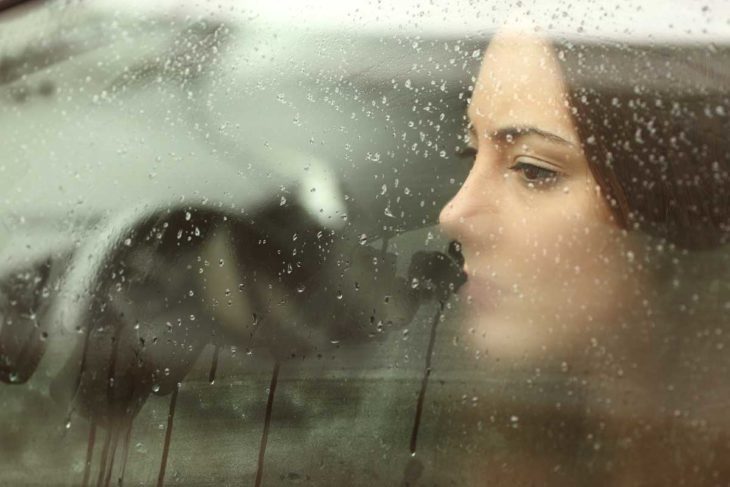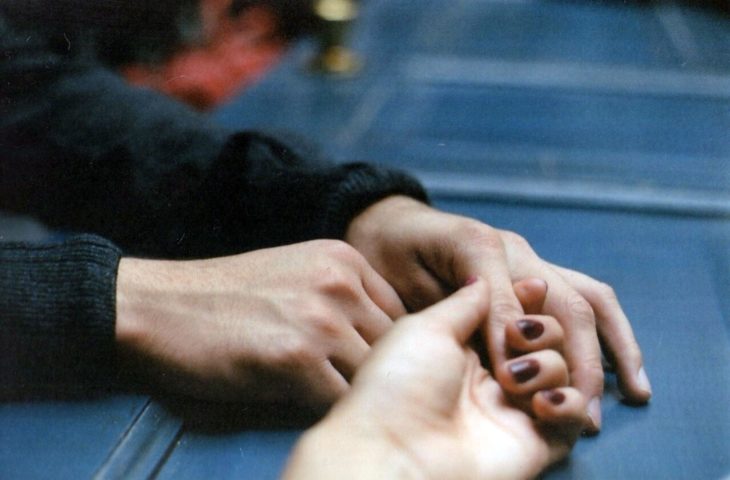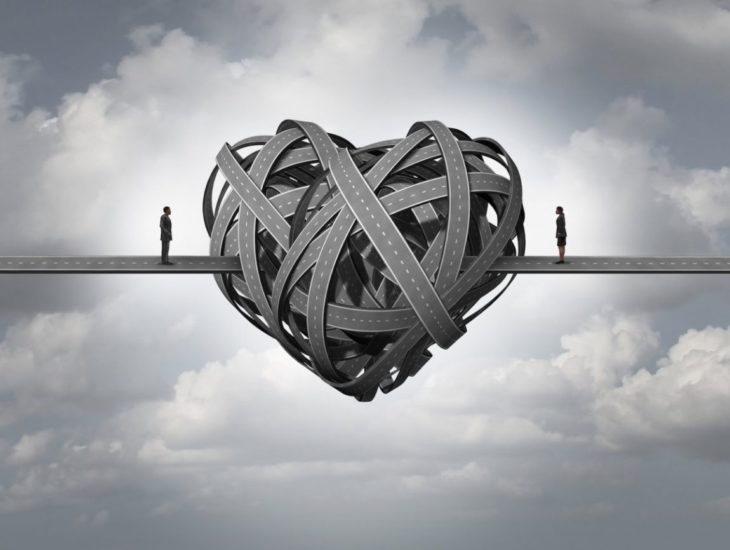If someone suggested that you were holding out for a relationship to save you and magically solve all your problems, you’d adamantly insist they’d gotten you all wrong and briefly consider slapping them in the face, right? Expecting a guy to save you sounds ludicrous on a surface level, and even reminiscent of the dreaded d-word (gasp, desperate) that’s so frequently used to knock women down a peg. The problem with the save-me complex, though, is that it isn’t usually so straightforward. Often, it lives in a more deep-rooted, unnoticeable part of the heart, inflicting men and women alike, silently motivating our choices without us even realizing. If it were an easy thing to detect, we’d nix it from the start, but instead, that sneaky idea has sabotaged almost everyone’s love life at one point or another.

Source: Alicia Galván
It’s not hard to see how this happens. Everyday life is tough, and Hollywood’s depiction of perfect romance seeps into our consciousness. Every movie ingenue’s life is miserable until she experiences a meet-cute with her dream man, and from there on out, everything is flawless. Her only problems revolve around whether or not she and her hero can stay together. In movies, falling in love means you suddenly flip a switch and no longer have credit card debt or a judgmental mother or stressful work deadlines, all because you’ve finally convinced a man (or lady) to cuddle with you on Sunday mornings.
In a relationship’s early days, it’s especially easy for love to feel like some intoxicating rom-com that will rescue you from the real world, and this period is when we’re most susceptible to the save-me complex. It may even seem to be coming true for a little while, but even if this new partner actually does want to solve all your problems, this sets up an unbalanced dynamic that will ultimately implode. No matter how much they may love brightening your day, another human being is not responsible for your feelings, and if they are actually volunteering to take on the burden of solving your every problem, they probably have some boundary issues they need to address on their own. We all make ourselves responsible for other people’s problems at some point, and we all know how terrible it feels when we get caught up in this.

Source: Playbuzz
Depending on anyone else to make you emotionally whole is unsustainable in the long haul, though depending on your partner to some extent is totally healthy and part of what makes relationships fulfilling. This is where the line between normalcy and save-me thoughts gets fuzzy, especially for those of us who teeter on the edge of the over-independence trap and regularly question our tendencies to lean on others in the first place. In my mind, a quality relationship comes from two whole, fully-formed people sharing the overflow of love within them with one another. That doesn’t mean either person is perfect, but that they’re committed to growing both as individuals and as a couple, and that they take responsibility for their own shortcomings and struggles. Essentially, to me, a whole person is one who doesn’t expect others’ love to fill up an emptiness inside of them. The “Jerry Maguire”-fueled “you complete me” mentality that encourages two people, devoid of fulfillment, to glom on to each other looking for saving, sounds like a recipe for pain and disaster.
Relationships can be awesome, and it makes perfect sense that humans pursue them and expect partnership to make their lives richer. In lots of cases, they do improve on the happiness you already have, but that’s very different than solving your pre-existing issues. If we acknowledge that relationships are worth looking forward to, it’s hard not to muddle the line between anticipating a meeting great partner and hoping they’ll save you. Is there any difference, really? Does it even matter? Rightly or wrongly, our society treats settling into a longterm partnership like a milestone. Many of us may reach a point in life in which we feel we’ve grown to a place we’re pleased with, but that in order to move to the next “step” of adulthood, we need a partner. I don’t agree with this generalization at all, but much of the world categorizes things this way.

Source: postmalesyndrome
It is 100 percent possible to become a parent or buy property or what have you without a partner, but most of the time, a relationship makes that process easier — so what happens when you have your shit together and are ready to move forward, and are feeling sort of stuck searching for a life partner to take those next steps with? What does that mean for the save-me complex, especially if, in some small sense, the support of a partner in those cases is a little bit saving? Wanting to be rescued isn’t limited to relationships — we do this with dream jobs, moves to new cities, new family connections — anything we can grab onto in hopes that it will save us from the fact that life is fucking hard. On a logical level, we know this isn’t realistic, but we’re only human, and we can’t help but imagine that the next big change in life will be the one that will absolve us of fear and loneliness and struggle.
On a personal level, I usually don’t realize how much this line of thinking has overtaken me until I’ve snapped out of it and have the advantage of retrospect. There have been times when, more subconsciously than anything, I’ve fallen into a pattern of thinking that spending time with my boyfriend would just make all my other outside stresses disappear. In that rut, life became disappointing and our relationship was suddenly under a strain. In those moments, nothing could make me happy, because nothing he could do would ever make my problems up and vanish. Whenever I’d shake myself out of it and go back to aiming to share my life with him instead of expecting him to be (or solve) my life, we’d become so much happier together. I’ve found that at least in my own life, those kinds of expectations put too much power in another person’s hands, and it’s usually power they don’t want. Suddenly, they’re crushed under an unnameable sense of pressure they can’t pinpoint — because they’ve become responsible for both their life and yours. I absolutely believe couples should comfort and lean on each other through hard times, but there’s a difference between supporting each other and expecting one another to fix it.

Source: refinery29
When my dad died, one of my first emotional reactions was an intense desire to get married — not immediately, but in some abstract future. As a girl who never really dreamed about weddings growing up, this was odd, but it all stemmed back to wanting to be saved. Some part of me imagined that the sense of family I’d gain from living with a husband would somehow make up for the piece of my family and sense of stability that I’d lost with my dad’s passing. Not surprisingly, all it really did was give me some weird means of distracting myself from the actual grief in front of me. That feeling has since drifted away, but I still have a much more intense desire to someday have a huge family than I ever did before my dad died, and that stems from the exact same frantic place inside of me which also compels people to assume the right guy will save them. It’s an imaginary life preserver I created as a means to feel like I’ll be guaranteed to be loved enough. I try to be easy on myself about it because of the circumstance, but it’s not exactly a healthy thing, and we all do it to some degree.
The reality is that nothing on this earth, partner or otherwise, can guarantee we’ll feel loved enough. Nothing can save you. Rather than a bitter truth, it’s actually somewhat comforting. You have the power within yourself to create the best life experiences you’ll ever have, because any emotional high that comes from elsewhere will be fleeting at best. If you can channel and recreate the joy you find from being with other people — partners or otherwise — you’ll be golden. Even if he wants to, your boyfriend can’t resolve your deepest inner fears or fight your scariest battles. Diving in headfirst to mend the holes in your heart, instead of expecting others to do so, makes life open up in the most magical ways, and maybe even makes your relationship more likely to thrive.

Source: lafamilytherapy
Most of us want to be saved on some level, and maybe that’s okay. It’s human nature, after all. I don’t know the answers, and I’m still learning every day about finding my own balance between leaning on my boyfriend and fighting my own battles. What I know so far is that saving yourself is one of the most loving things you can do, not only for you, but for your partner. It frees up your relationship as a place for more joy and healthy venting instead of drowning in each other’s burdens. If your partner is also committed to saving himself, you’ll find yourself in a wonderful sweet spot — supporting one another as you each do the invigorating and difficult work of being your own hero, with an amazing teammate there to catch you when you trip and cheer you on along the way.
Have you ever found yourself wishing you could be rescued? Any thoughts to share?
Original by
